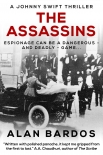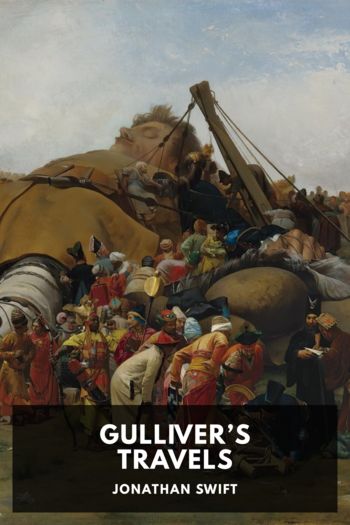The Assassins by Alan Bardos (best novels in english txt) 📗

- Author: Alan Bardos
Book online «The Assassins by Alan Bardos (best novels in english txt) 📗». Author Alan Bardos
Distant chimes of the Catholic Cathedral sounded, followed by those of the Orthodox Church and a minute later the sound of the Muslim clock tower. It was then that Johnny saw him among the colour of the swirling crowds, out of sync but regular as clockwork - the lone frock-coated figure of Harding-Brown, the quintessential Englishman. A bulwark against everything that was not quite right and foreign, he skirted the edge of the old town trying to keep to the safe western parts of the city, while being drawn to the mysteries of the Orient. Johnny finished his coffee and left.
He caught up with Harding-Brown as he passed a rather seedy looking basement cafe. Johnny had been watching him since being dismissed from his office and couldn’t help but notice the way he always idled outside the cafe, both fascinated and appalled, desperate to go inside and yet repelled at the same time.
'Good afternoon,’ Johnny said. Harding-Brown turned around, startled. Johnny held out his hand and Harding-Brown was forced to shake it.
'Good afternoon,' Harding-Brown replied warily. Johnny had caught him as he'd been looking helplessly at the veiled women going into the cafe. Judging from the way Harding-Brown was staring at the mysterious figures drifting past, he'd never once lifted the veil on his inhibitions.
'My name's Swift - we spoke briefly in your office,' Johnny said, pretending not to have noticed Harding-Brown's embarrassment.
'Yes, yes I remember,' Harding-Brown replied, his eyes flitting about, trying to find some means of escape.
'I was hoping I might be able to talk to you. I still have a few questions that I need to ask,' Johnny said.
'I think I’ve said all that I have to say to you, Master Swift,' Harding-Brown answered, desperate to get rid of Johnny. ‘I don't know how you conduct yourselves in Paris, but here we don't solicit one another in the street like common hawkers.'
‘Quite right, maybe we should go somewhere to talk. This cafe has, I believe, a most amenable atmosphere.’ Johnny grinned knowingly.
Harding-Brown baulked at his barefaced cheek. ‘Certainly not...’
‘Perhaps I should go to the British Consulate again,’ Johnny said, raising his voice.
Harding-Brown glanced around, mortified to hear the place of his employment mentioned in such a scandalous part of town.
‘When would be a convenient time for me to see you at the British Consulate?’ Johnny asked, even louder.
Harding-Brown started to move away but Johnny caught him as he was off balance and hauled him towards the cafe. He hadn’t been the captain of the school rugby club for nothing, he reminded himself.
‘Come on, we’ll have a drink and enjoy the show. As you say, the street isn't really the place to talk,’ Johnny said and Harding-Brown stopped struggling; he wasn’t very strong.
*
Gavrilo Princip left the police station and headed back to his boarding house through the crowded streets of the merchant district. He hated Sarajevo, he hated the commercialism of the place and the decadence it harboured. Most of all he hated the feeling of being under the control of a foreign power in his own country. The oppressive feel of the invaders screamed out from the very architecture of the city, echoing the corruption they had brought.
He turned into his street and opened the door of his lodgings - the corruption had even found its way into his boarding house. It was the same boarding house where his revolutionary spirit had first grown, under the mentorship of his friend, Danilo Ilic. The house belonged to Ilic’s mother, who had furnished it in the eclectic mix of east and west that characterised this city, with worn, but brightly coloured rugs contrasting with shiny new dressers and a chest of drawers made in Vienna.
To his annoyance, Gavrilo found Nedjo taking coffee with Ilic in the kitchen. He was showing Ilic a new sports cap he’d brought. Gavrilo ignored Nedjo and greeted Ilic with, ‘I’ve done it.’
‘Good. I know it couldn’t have been easy for you Gavro,’ Ilic answered, with a concerned expression on his pale, raw-boned face.
Gavrilo shrugged in reply and sat at the table. He’d just undergone the indignity of registering his arrival in the city; with his radical background he didn’t want to give the police any reason to suspect him.
Ilic silently handed him a small cup of coffee and sat down, nervously brushing a hand over his close cropped blonde hair. Gavrilo saw that he’d quickly realised his mood and although Ilic was taller and older than Gavrilo, he knew better than to antagonise him further by continuing the subject and risking his fury.
‘I have already registered,’ Nedjo said. Gavrilo bristled - he had never known Nedjo to exercise Ilic's good sense. ‘My father insisted.’
Gavrilo continued to ignore Nedjo. As well as his lack of tact, Gavrilo was still angry about his behaviour during the journey from Belgrade and couldn’t bring himself to forgive Nedjo’s recklessness.
‘We must start to make plans to act, for when the tyrant comes,’ Nedjo said, unperturbed by Gavrilo’s coldness.
‘You will be told if and when you are needed,’ Gavrilo said.
‘But it was me who was sent the clipping, when we were in Belgrade,’ Nedjo said in disbelief.
‘How am I to trust you, Nedjo, after the way you behaved on the journey from Belgrade?’ Gavrilo said acidly and Nedjo sat back looking stunned and hurt.
‘We are still making plans, Nedjo. Nothing has been decided,’ Ilic said conciliatorily.
‘We will act, that is for certain,’ Gavrilo said, annoyed at his friend’s indecision.
‘Are you sure that now is the right time? There is still much to be done, Gavrilo. I am still trying to recruit people.’
‘Now is our time,’ Princip snapped.
‘But there is no plan,’ Ilic said.
‘We





Comments (0)